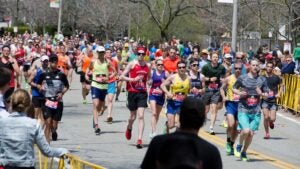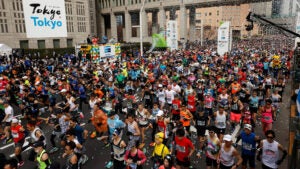New perk: Easily find new routes and hidden gems, upcoming running events, and more near you. Your weekly Local Running Newsletter has everything you need to lace up! Subscribe today.
When I registered to run my first marathon in 2016—the Boston Marathon—I thought it would be a one-and-done endeavor.
I didn’t consider myself a runner; I was a former gymnast just looking for a new goal to keep me motivated to move, because bouncing from boutique fitness class to boutique fitness class wasn’t doing it for me anymore. The Boston Marathon was the only marathon I was really aware of, mostly because I went to college in the city and celebrated Marathon Monday for four years.
Training for the Boston Marathon got me hooked on running. I’m a journalist: I work well with deadlines, and I crave the kind of structure that marathon training can add to a fitness routine. At face value, it seemed pretty simple: If I did X (training), I would achieve Y (finishing the race). And it worked. I finished the race, but I finished wanting—and believing I could do—more.
Later that year, after finishing the New York City Marathon, someone asked me if I was going to do all of the World Marathon Majors. At the time, I was still so new to running that I didn’t even know that the Boston and New York City marathons were part of a bigger circuit of races, and a bigger goal many runners were chasing.
The Abbott World Marathon Majors are the six largest and most prestigious marathons in the world: Berlin, Boston, Chicago, London, New York, and Tokyo. The international circuit of races was originally organized as a competitive series for pro runners in 2006 (before Tokyo was in the mix), with a championship title being awarded every two years, and the women’s and men’s champions taking home $500,000 apiece. While the initial focus was mostly on the pros, the idea of finishing all of the Marathon Majors—which added Tokyo in 2013—became a small but real thing among age-group runners that both paralleled and fueled the emerging trend of runners traveling to destination running races.
Runners who finish all six races earn a Six-Star Medal, a behemoth of a trinket made up of six smaller medals melded together, plus an entry into an exclusive club within the running community. It’s a massive undertaking, one that involves thousands of miles, multiple international trips, and a hefty financial investment—including race fees, travel costs, and, for many people, charity fundraising. For a lot of people, pursuing this goal takes years of dedication, which requires a certain amount of privilege.
Once a niche goal, the quest to complete all six World Marathon Majors—Berlin, Boston, Chicago, London, New York, and Tokyo—has been growing in popularity, especially as running participation has skyrocketed since the Covid-19 pandemic and race fields have returned to full capacity.
As of the 2023 New York City Marathon, there have been 12,772 six-star finishers, according to Abbott. In 2019, 2,335 runners earned their six-star medal; in 2023, that number jumped to 4,574. But it still remains a goal that’s more accessible to all runners: The average six-star finisher is about 50.5 years old, and has an average finish time of 4:02:54. The U.S. leads all countries in Six-Star Medal winners with 2,866, followed by the U.K. (1,241), Germany (660), Italy (649), Canada (564), and China (472). (In 2021, a WMM official age-group world championship debuted, giving more age-groupers a reason to run all six.)
RELATED: What You Need to Know About the 2024 Boston Marathon

Why Run All of the Majors?
I loved the challenge. And I appreciated the opportunity to chase a big running goal that wasn’t inherently time-based. Marathoning, to me, is an amateur’s sport. Yes, there is a top tier of incredibly inspiring elite athletes—but for every one of those, there are countless amateur runners of all paces who log thousands of lonely miles, spend months waking up in the darkness to get their workouts done, and defeat the fear that they’re chasing an impossible dream.
I’m never going to qualify for the U.S. Olympic Trials. I’m not even sure if I’ll ever qualify for the Boston Marathon. No brand is going to pay me to represent them on the podium. But I could commit to finishing six Marathon Majors across the globe, especially since it didn’t matter how long it took.
The same year I finished the 2016 Boston Marathon, I ran the 2016 New York City Marathon. In 2018, I ran Berlin, and, in 2019, London. I ran the 2021 Chicago Marathon, and—finally, after it was canceled in 2020, 2021, and 2022—I earned my Six Star Finisher medal in the 2023 Tokyo Marathon.
Yes, I got faster along the way. I started this journey solely focused on time, and hoped that by the end of the journey, I would “earn” my way back to Boston. It took those six marathons (plus another six marathons) for me to realize I didn’t have to prove anything to anyone. Letting go of an obsession with faster times in favor of enjoying the process led to faster times and a better appreciation of the experience. I did run a personal best in Tokyo, but what I remember most about that day was the pride and excitement I felt knowing that every step was one step closer to that Six Star Finisher medal.
When I started my Six Star journey in 2016, I think less than 1,000 runners had done all six races. Since 2019, though, running has seen a huge surge in popularity. It was the most-uploaded sport in 2023 according to Strava’s annual Year in Sport report, and racing is also on the rise—21 percent of runners on Strava ran at least one race in 2023, a 24 percent increase over 2022, and 5 percent of runners on Strava ran a marathon in 2023, up 20 percent from last year.
RELATED: What It’s Like To Run the Tokyo Marathon

My Thoughts on Overcrowding and a Seventh Star
I’m thrilled to see the number of Six Star finishers grow. I know there’s backlash online about overcrowding, sponsor bibs, and stricter qualifying times at Marathon Majors, and I recognize the privilege required to pursue this type of goal. But I also know what it felt like to finally finish my sixth Major. Last March, when the volunteers at the Abbott tent looped that Six Star medal around my neck in front of Tokyo Station, it was a surprisingly emotional moment for me. I’ve run more than 288 miles on World Marathon Majors courses over the past eight years, spent countless hours training through every season, and met so many people from all parts of the running community; choosing to pursue this goal literally changed my life. Who wouldn’t want more runners to have that experience?
For now, I’m happy to take a break from racing these iconic courses. I have no intention of going after a second Six Star medal anytime soon (as of November 2023, 119 athletes have completed their Six Star journey more than once). The World Marathon Majors weekends are wildly overstimulating (mostly in a good way), but it can also make it hard to prioritize running your goal time—especially if being there is a part of your job!
But the rumors of a seventh star are getting more serious. In November 2023, the Abbott World Marathon Majors confirmed that the Sydney Marathon in Australia would proceed to the second stage of the candidacy process required to join the series; it’s the first race to pass the AbbottWMM stage one assessment (the Cape Town Marathon in South Africa and the Chengdu Marathon are also candidates, but they’re still in stage one). For runners who have already earned their Six Star medal, there will likely be a new—additional—awards program announced later in 2024. When that happens, you better believe I’ll be one of the first in line to chase that goal.
RELATED: Dave McGillivray’s Extraordinary Boston Marathon Streak is Coming Full Circle
